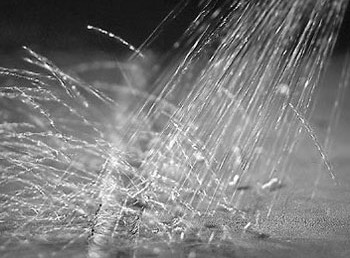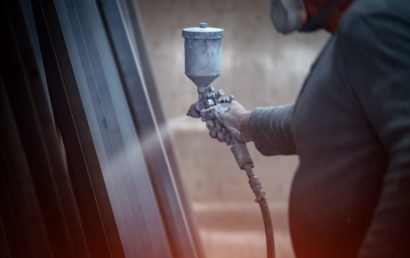Thermal Sprayed Aluminum Helps Reduce Corrosion Under Insulation Issues
CUI (corrosion under insulation) plagues pipeline systems in today’s petrochemical industry. A large percentage of maintenance budgets is consumed due to this occurrence. Pipeline replacements, painting, reinstallation of insulation, insulation removal, and external piping inspections are expensive and account for a large portion of a company’s budget. To provide reliable and long-term CUI prevention, CUI inhibition strategies include the use of thermal sprayed aluminum.
With thermal sprayed aluminum, significant reductions in maintenance costs, and a move toward maintenance- and inspection-free piping systems is accomplished.
What Is CUI?
To put it simply, when, on an external surface of equipment that is insulated, moisture is present – and that moisture causes corrosion – CUI (corrosion under insulation) occurs. Multiple factors can cause the attack/damage. Additionally, it can occur, depending upon conditions, in equipment operating at heated, low, and ambient temperatures.
As a result of water penetration, beneath insulation around vessels and piping, corrosion is a significant problem. The water can come from a variety of sources including the following:
- Sweating from high/low temperature changes
- Wash water
- Deluge system water
- Leakage
- Rainwater
- … and more
CUI inspections involve pipeline checks after insulation removal, then the replacement of the insulation. It is a time-consuming and expensive method. Attendant complications and asbestos are occasionally involved during insulation removal, complicating the logistics.
Types of inspections are as follows:
- Ultrasonic
- Radiographs or x-ray
- Eddy current testing
- Magnetic particle
- Dye or liquid penetrant
- Microscopy
- Visual inspection
The Thermal Spray Process
The process of thermal spraying involves small molten metal particles being projected onto a surface that is blast prepared. Onto the surface, the particles flatten upon contact, freeze, and bond mechanically. Onto the blasted substrate, they bond first; then, as the coating thickness increases, to each other. A heat source is used to create the molten particles. Also used is a projection method and an appropriate spray material.
The Petrochemical Industry and TSA
Thermal sprayed aluminum (TSA) is being used by any number of businesses involved in the petrochemical industry as one method of protection. Compared to other systems, this is a cost-effective solution when reviewed over a facility’s lifetime. Some petrochemical plants apply TSA (or have it supplied) as an ongoing program. For long-term protection against CUI and atmospheric corrosion, this is an excellent solution.
An Example Of TSA In the Petrochemical Industry
The use of TSA and its benefits can be examined by looking at a specific project:
Used for transporting lube oil, a Marine jetty pipeline that is three quarters of a mile long is using TSA. This pipeline is exposed to a marine environment known for its harshness and destructive qualities. Including work on a live operating plant, this site also involves other projects ranging from a full range of vessels to pipes.
It is critical, in this situation, that proper preparation of pipeline surfaces be executed in order to assure the success of the thermal spray process. Garnet grit blasting was used to prepare this pipeline surface. This provides, for TSA bonding, a sharp angular profile. Using “Testex tape”, the blast profile was checked regularly, as part of the quality control and quality assurance process. Visual inspections were also done repeatedly.
Following the process of TSA application, the process was sealed. If the spray area is a hot and operational, no sealer is applied in some CUI related environments, however.
A&A Coatings – The Thermal Spray Experts
Could your business use thermal sprayed TSA to protect pipes, parts, components, machinery, and more? Chances are, it’s already being used in your industry.
Contact us at A&A Coatings today for more information.



